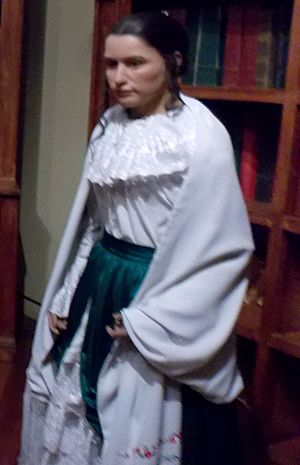Manuela de la Santa Cruz y Espejo facts for kids
Quick facts for kids
Manuela de la Santa Cruz y Espejo
|
|
|---|---|

Wax statue of Manuela de la Santa Cruz y Espejo at the Alberto Mena Caamaño Museum
|
|
| Born |
María Manuela Dominga de Espejo y Aldaz
20 December 1753 |
| Died | 1829 Quito, Gran Colombia
|
| Nationality | Ecuador |
| Occupation | Journalist, nurse |
| Spouse(s) | José Mejía Lequerica |
| Parent(s) | Luis Espejo (father) Catalina Aldaz (mother) |
| Relatives | Eugenio Espejo (brother) |
Manuela de la Santa Cruz y Espejo (born María Manuela Dominga de Espejo y Aldaz) was an important woman from Ecuador. She was born on December 20, 1753, and passed away in 1829. Manuela was a journalist, a nurse, and a fighter for change. She believed in new ideas and helped lead a revolution. She was also the sister of Eugenio Espejo, a famous thinker. They both shared ideas from the Enlightenment, which was a time of new ways of thinking.
Contents
Manuela Espejo's Life Story
Early Life and Family
María Manuela Dominga de Espejo y Aldaz was born in Quito on December 20, 1753. At that time, Quito was part of the Spanish Empire. Her birth name is written in the old records of La Iglesia de El Sagrario. Manuela was the youngest of five children. Her parents were Luis Espejo and Catalina Aldaz. Her father was a teacher of medicine and natural sciences.
Manuela later married José Mejía Lequerica. He was a lawyer. They were married in the Church of El Sagrario.
Helping Others as a Nurse
Manuela often went with her brother, Eugenio Espejo, on his medical visits. She acted as a nurse, helping him care for patients. In 1785, a serious outbreak of yellow fever hit Quito. Manuela and Eugenio both helped with the relief efforts. They worked hard to care for the sick.
Manuela also looked after her brother, Juan Pablo de Espejo, when he became ill in 1764. Because of her work, some people consider her to be Ecuador's first nurse. She learned a lot about medicine from a large 26-volume encyclopedia. This book was left to her by Lorenzo Heinster.
Fighting for Change as a Journalist
Manuela was also a brave journalist. She wrote for a newspaper in Quito. She used the pen name "Erophilia" to protect herself. Through her writings, she defended her brothers. They were often accused of things by the Spanish government.
Manuela also wrote strong messages called manifestos. These writings called for better treatment of women. She also spoke up for people who were poor. She believed everyone deserved to be treated fairly.
See also
 In Spanish: Manuela de la Santa Cruz y Espejo para niños
In Spanish: Manuela de la Santa Cruz y Espejo para niños
 | Delilah Pierce |
 | Gordon Parks |
 | Augusta Savage |
 | Charles Ethan Porter |

